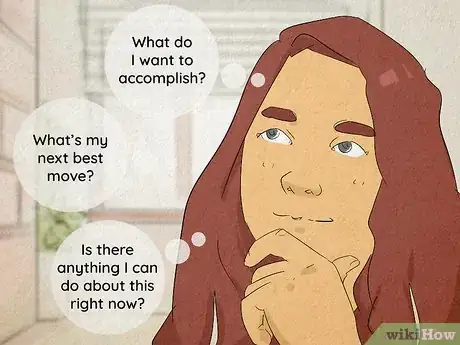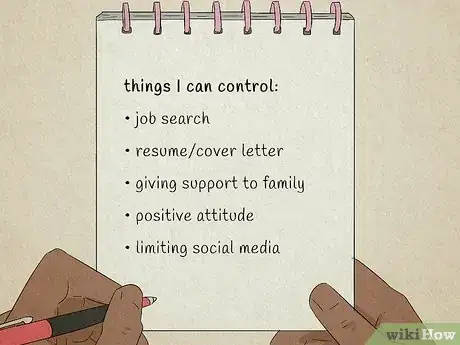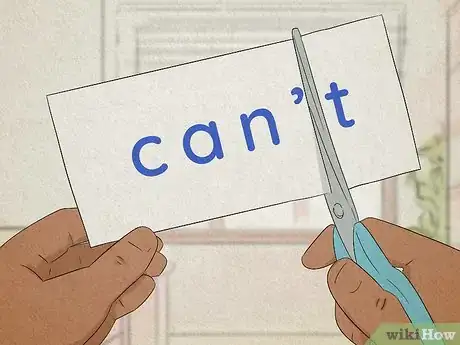This article was co-authored by Carolyn Rubenstein, PhD and by wikiHow staff writer, Jessica Gibson. Dr. Carolyn Rubenstein is a Licensed Clinical Psychologist based in Florida. She specializes in working with adults on anxiety, perfectionism, and burnout. She is also the Chief Wellness Adviser for global esports organization Misfits Gaming Group. Dr. Rubenstein holds a BA in Psychology from Duke University, an MA in Psychology from Harvard University, and a PhD in Counseling Psychology from The University of Miami. She also has a Certification in Eye Movement Desensitization and Reprocessing through the EMDRIA (Eye Movement Desensitization and Reprocessing International Association).
There are 14 references cited in this article, which can be found at the bottom of the page.
This article has been viewed 77,086 times.
At some point in your life, you might feel like things aren't going the way you want. This probably means that it's time to change your perspective in order to change your life. While this sounds like a big task, it's really about adjusting your mindset to focus on what you hope to achieve. With a few small changes, you can do this!
Steps
Expert Q&A
-
QuestionHow can I change my focus quickly?
 Carolyn Rubenstein, PhDDr. Carolyn Rubenstein is a Licensed Clinical Psychologist based in Florida. She specializes in working with adults on anxiety, perfectionism, and burnout. She is also the Chief Wellness Adviser for global esports organization Misfits Gaming Group. Dr. Rubenstein holds a BA in Psychology from Duke University, an MA in Psychology from Harvard University, and a PhD in Counseling Psychology from The University of Miami. She also has a Certification in Eye Movement Desensitization and Reprocessing through the EMDRIA (Eye Movement Desensitization and Reprocessing International Association).
Carolyn Rubenstein, PhDDr. Carolyn Rubenstein is a Licensed Clinical Psychologist based in Florida. She specializes in working with adults on anxiety, perfectionism, and burnout. She is also the Chief Wellness Adviser for global esports organization Misfits Gaming Group. Dr. Rubenstein holds a BA in Psychology from Duke University, an MA in Psychology from Harvard University, and a PhD in Counseling Psychology from The University of Miami. She also has a Certification in Eye Movement Desensitization and Reprocessing through the EMDRIA (Eye Movement Desensitization and Reprocessing International Association).
Licensed Clinical Psychologist Be realist and don't expect yourself to change focus instantaneously, especially if you're going from hanging out with your children to an executive meeting. Take five deep breaths and try to mentally shut off, turning your attention to what's right in front of you.
Be realist and don't expect yourself to change focus instantaneously, especially if you're going from hanging out with your children to an executive meeting. Take five deep breaths and try to mentally shut off, turning your attention to what's right in front of you. -
QuestionWhat to do when you need to study but can't focus?
 Carolyn Rubenstein, PhDDr. Carolyn Rubenstein is a Licensed Clinical Psychologist based in Florida. She specializes in working with adults on anxiety, perfectionism, and burnout. She is also the Chief Wellness Adviser for global esports organization Misfits Gaming Group. Dr. Rubenstein holds a BA in Psychology from Duke University, an MA in Psychology from Harvard University, and a PhD in Counseling Psychology from The University of Miami. She also has a Certification in Eye Movement Desensitization and Reprocessing through the EMDRIA (Eye Movement Desensitization and Reprocessing International Association).
Carolyn Rubenstein, PhDDr. Carolyn Rubenstein is a Licensed Clinical Psychologist based in Florida. She specializes in working with adults on anxiety, perfectionism, and burnout. She is also the Chief Wellness Adviser for global esports organization Misfits Gaming Group. Dr. Rubenstein holds a BA in Psychology from Duke University, an MA in Psychology from Harvard University, and a PhD in Counseling Psychology from The University of Miami. She also has a Certification in Eye Movement Desensitization and Reprocessing through the EMDRIA (Eye Movement Desensitization and Reprocessing International Association).
Licensed Clinical Psychologist Try building a transition between what you were doing and the study, especially when you want to focus on things that are highly analytical. You have to king of switch gears, calming down your nervous system and resetting before actually focusing on the task at hand.
Try building a transition between what you were doing and the study, especially when you want to focus on things that are highly analytical. You have to king of switch gears, calming down your nervous system and resetting before actually focusing on the task at hand.
References
- ↑ https://www.motivationalwellbeing.com/positive-thinking.html
- ↑ https://www.winona.edu/resilience/Media/Taking-Perspective-Worksheet.pdf
- ↑ https://wellingtonlifecoaching.co.nz/wp-content/uploads/2020/03/TYCOACHING-ANXIETY-SOLUTIONS-GUIDE-EMPOWERING-QUESTIONS.pdf
- ↑ Carolyn Rubenstein, PhD. Licensed Clinical Psychologist. Expert Interview. 9 September 2021.
- ↑ https://www.helpguide.org/articles/stress/surviving-tough-times.htm
- ↑ Carolyn Rubenstein, PhD. Licensed Clinical Psychologist. Expert Interview. 9 September 2021.
- ↑ https://www.iom.int/sites/default/files/staff-welfare/managing_emotions.pdf
- ↑ Carolyn Rubenstein, PhD. Licensed Clinical Psychologist. Expert Interview. 9 September 2021.
- ↑ https://www.helpguide.org/articles/mental-health/cultivating-happiness.htm
- ↑ https://www.psychologytoday.com/us/blog/friendship-20/201812/8-ways-catch-all-or-nothing-thinking
- ↑ https://www.urmc.rochester.edu/encyclopedia/content.aspx?ContentID=4552&ContentTypeID=1
- ↑ Carolyn Rubenstein, PhD. Licensed Clinical Psychologist. Expert Interview. 9 September 2021.
- ↑ https://www.ncbi.nlm.nih.gov/pmc/articles/PMC5351796/
- ↑ https://journals.sagepub.com/doi/abs/10.1509/jm.75.2.109
- ↑ https://www.ncbi.nlm.nih.gov/pmc/articles/PMC5351796/
- ↑ https://www.mayoclinic.org/healthy-lifestyle/adult-health/in-depth/change-your-mind-to-grow/art-20342132
- ↑ https://youtu.be/Hu4Yvq-g7_Y?t=273
- ↑ Carolyn Rubenstein, PhD. Licensed Clinical Psychologist. Expert Interview. 9 September 2021.
- ↑ https://pubmed.ncbi.nlm.nih.gov/22941876/







































































